Iraqi Forces Attacking Syrian Rebels
The regime we fought for in Iraq is now aiding the regime we're fighting against (at least by proxy) in Syria.
As the tenth anniversary of our war to spread democracy and peace in Iraq approaches, our good friends in Baghdad are fighting for the forces of tyranny.
Al Arabiya (“Iraqi forces attack FSA positions inside Syria“):
For the first time, Iraqi forces opened fire on Syria shelling the positions of the Free Syrian Army (FSA) days after Iraqi Prime Minister Nouri al-Maliki warned that a victory of the Syrian opposition would spread chaos in the region.
Al Arabiya correspondent near the Syrian-Iraqi border reported that Iraqi snipers took up positions on buildings near the Rebiya crossing while others forces shelled the positions of the Free Syrian Army.
The correspondent said that large reinforcements were being deployed by the Maliki government in Baghdad near the Syrian borders.
On Wednesday, Maliki warned if victory by Syrian rebels will spark sectarian wars in his own country and in Lebanon and will create a new haven for al-Qaeda that would destabilize the region.
“Neither the opposition nor the regime can finish each other off,” he said. “If the opposition is victorious, there will be a civil war in Lebanon, divisions in Jordan and a sectarian war in Iraq,” Maliki said in an interview with the Associated Press.
So, to recap, the regime we fought for in Iraq is now aiding the regime we’re fighting against (at least by proxy) in Syria.
via Erin Simpson
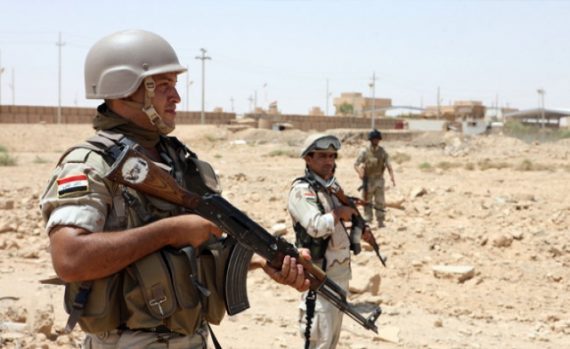

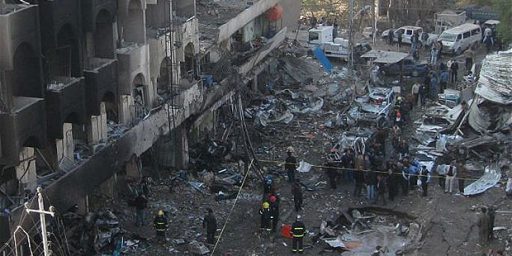
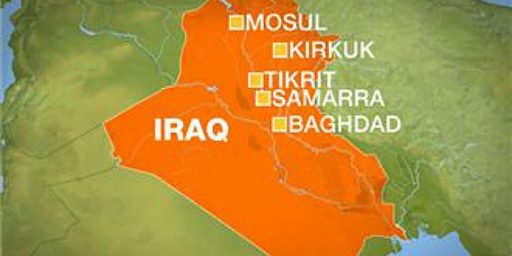
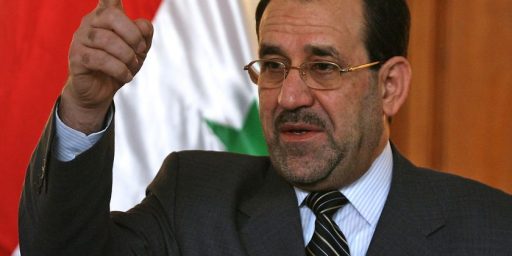
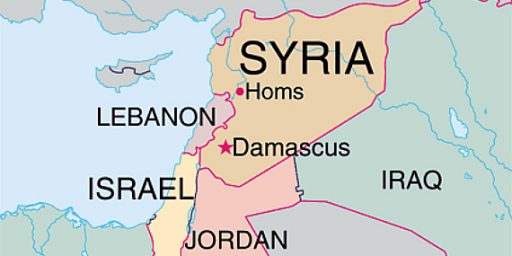
I think it would not have been overdone to work “beacon of democracy” into that story.
It kind of reinforces how badly the whole adventure failed.
More importantly, the regime we fought for, and sacrificed about a trillion dollars, 4,000+ lives and tens of thousands of casualties, for is essentially acting as a proxy for the Islamic Republic of Iran.
Nice to see Democratic Peace Theory working out so well.
Well, the problem is that things are complicated. Some of the Syrian rebels are secular moderates, but some are Sunni fundamentalists, much like those who are fighting the Shia dominated government in Iraq.
Unfortunately in the ME, things are always complicated. Its why, if you are going to intervene at all, you need to know what the hell you are doing, and who all the players are. And also too, the Middle Eastern corollary to Murphy’s Law- if blowback can happen, it will.
We know that the Syrian regime is bad.
Do we have any indicators that the rebels would be any better?
This could be a case like Egypt or Libya.
@Doug Mataconis:
An example of the Republican strength with numbers:
@Jenos Idanian #13:
Good lord. When you think “what can I possibly say to mitigate the errors of my party,” do some self-editing.
Think abut the much more trivial and tenuous logic you’ve used to make Libya look bad.
Try for some intellectual rigor.
@Doug Mataconis: This was predicted by many at the start of the war. The real winner of the Iraq war was Iran.
@Doug Mataconis:
This single event should end the myth of “expertise” of the Republican party on foreign policy forever.
I won’t wait up for that to happen, but it should.
Something missing from the Al Arabiya article is why now? Did the FSA attack an Iraqi site, were Syrian troops doing hit and run raids from Iraq, etc. Moving troops to the border of a neighbor having civil war does make sense as does sighting in a border crossing.
@walt moffett:
I think the key was the quote where “Iraqi Prime Minister Nouri al-Maliki warned that a victory of the Syrian opposition would spread chaos in the region.”
That was a blanket opposition to the opposition, and not any subset.
But see, James, that’s one of the problems. Our war was not a war to spread democracy and peace in Iraq.
@Kathy Kattenburg: It was never clear what our war aim was, exactly. Or, rather, or war aim seemed to constantly drift.
When it was about “Saddam’s an evil dude who killed his own people,” I opposed the war effort. It made no sense to fight a war over something 20 years in the past.
It eventually shifted to a combination of “he’s on the verge of getting WMD and could give them to terrorists” and some lesser aims related to US national security. And I reluctantly came to support that war.
After the fall of the regime, though, it became about a whole host of things and ratcheted up slowly. Security. Elections. Beating the insurgency. Fighting for those who’d bet their lives on trusting us. And more.
Well, yeah. That’s called “mission creep” — as you suggest in the opening lines of your comment. But, first, it really isn’t true that it was never clear what our mission there was. It was only unclear to the American people. It was always clear to the people who started the war why they wanted to start it. And their reasons had nothing to do with any of those factors you listed — not Saddam Hussein’s atrocities 20 years before, not because Saddam had WMDs, not to free the Iraqi people, not any of that. The real reasons were geopolitical, economic, and personal — the last specifically referring to George W. Bush, of course. But of course none of those reasons would have worked to gain public support for the war. All of the reasons stated (by the Bush admin) for the war were lies and distortions intended to persuade the American public to get behind the war.
Second, all those later “reasons” — putting down the insurrection, not letting our “allies” down, justifying the American deaths that had already occurred, etc. — were all (obviously) reasons that sprang out of and were caused by the war itself. I don’t think it works to justify a war by citing the very problems generated by starting the war in the first place.
Third, the outrage you wrote about in your post — the Iraqi government supporting the rebels trying to take down the Assad dictatorship — was entirely predictable before the war started, and in fact WAS predicted, by many people. I have no argument with your outrage at what Iraq is doing. I mean, it IS outrageous. It’s terrible. It’s also entirely unsurprising, as others here have pointed out before me.
Greetings:
What was that that Fouad Ajami wrote about the Middle East? Those are the lands of “I against my brother; my brother and I against our cousin; and, my cousin, my brother, and I against the stranger”.
Islam is the millstone. If your plan doesn’t include constraining, undermining, or eradicating Islam, you don’t have a plan. What you have is a hope.
And oh yeah, in case you didn’t see the memo, Muslim gratitude is like a Missouri-Warhol River; a verbal mile wide; an actual inch deep; and flowing for about 15 minutes.
@john personna:
Actually, I was pondering why the Iraqi’s were shooting at the FSA, this Al-Jareaza article gives the idea is a response to a border incident, not taking sides in the Syrian Civil War (or whatever it will be called). Everything else is crying over spilled milk.
@James Joyner: Let’s be honest. PNAC and the Bush II administration put out a lot of shifting rationales for the war. Often so carefully and legalistically phrased it was obvious at the time they were lying. The only reason that makes sense is that Iraq had a lot of oil and the sanctions regime kept oil companies from getting their hands on it except in small, smuggled quantities. On its face, that sounds cynical, but show me some other credible reason. And don’t tell me WMDs. As the Downing St memo confirmed, they made that up.